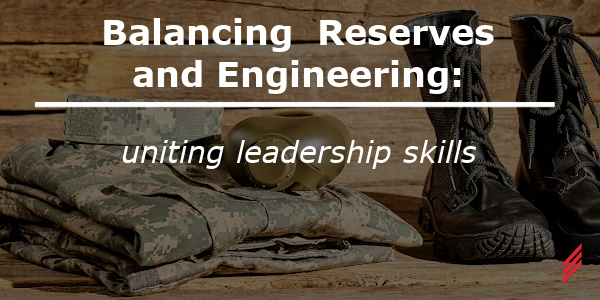Balancing Reserves & Engineering: Uniting Leadership Skills
by Justin Houghten on Mar 14, 2024 10:30:00 AM

Balancing life in the Reserves and pursuing a career as an engineer may seem like an overwhelming juggling act but can be very rewarding. The remarkable part of this journey is how the leadership skills developed in both roles can complement and enhance one another.
Many reservists maintain a civilian career while serving in the Reserves, and engineers are no exception. Our dual roles often demand an unwavering commitment to time management, adaptability, and resilience.
Time Management
One of the key challenges is time management. Both the Army Reserves and engineering professions require a significant time investment. Engineers must meet project deadlines, while reservists must adhere to training schedules and be ready for deployment. Striking a balance necessitates meticulous planning and organization.
Adaptability
Reservists are trained to adapt to ever-changing environments, and this skill is valuable in engineering. In both roles, unexpected challenges frequently arise. Whether it's troubleshooting a technical problem or responding to a sudden mission change, the ability to adapt is crucial.
Resilience
Reservists often endure physical and mental challenges during training and deployments. This builds resilience, which is equally crucial for engineers. Overcoming engineering challenges and learning from failures can be the hardest part of the profession. Reservists' mental toughness can help engineers stay persistent when faced with daunting problems.
Shared Leadership Skills
The crossing of Reserves and engineering also assists in the development of shared leadership skills that benefit both worlds.
Communication
Both roles require effective communication. In the Reserves, clear communication is essential for ensuring mission success. Engineers apply this skill when conveying technical information to team members and clients.
Teamwork
Reservists and engineers work closely in teams. In the Reserves, teamwork is critical for achieving objectives. Similarly, engineering projects often involve collaborating with many people and utilizing their unique skill sets, and the ability to work together cohesively is a shared trait.
Decision-Making
Leadership roles in the Reserves require making critical decisions under pressure. These skills are readily transferable to engineering, where engineers must make important decisions about projects, task allocation, and risk management.
Problem-Solving
Both domains value problem-solving skills. Reservists often need to quickly find solutions to unforeseen challenges, and engineers employ their analytical skills to solve technical problems, often under tight deadlines.
Conclusion
Balancing life in the Reserves and an engineering career is demanding, but the rewards are significant. The leadership skills cultivated in both realms are transferable and mutually reinforcing. Time management, adaptability, and resilience enable reservists to thrive in engineering, while effective communication, teamwork, decision-making, and problem-solving enhance their performance in both domains. This unique dual life enriches individuals with a diverse skill set that assist them as leaders, not only on the battlefield but also in the office.
About the Author
Justin Houghten is a Project Manger in the Electrical Safety Services group. He has been with Hallam-ICS over 10 years, working out of the VT Office, NC Office, and most recently the NY Office. He enjoys spending time with his family, traveling, and having creative outlets.
Read My Hallam Story
About Hallam-ICS
Hallam-ICS is an engineering and automation company that designs MEP systems for facilities and plants, engineers control and automation solutions, and ensures safety and regulatory compliance through arc flash studies, commissioning, and validation. Our offices are located in Massachusetts, Connecticut, New York, Vermont and North Carolina Texas, Florida and our projects take us world-wide.
You May Also Like
These Related Stories

How to become an engineer

You Talkin’ ‘Bout Me?



No Comments Yet
Let us know what you think